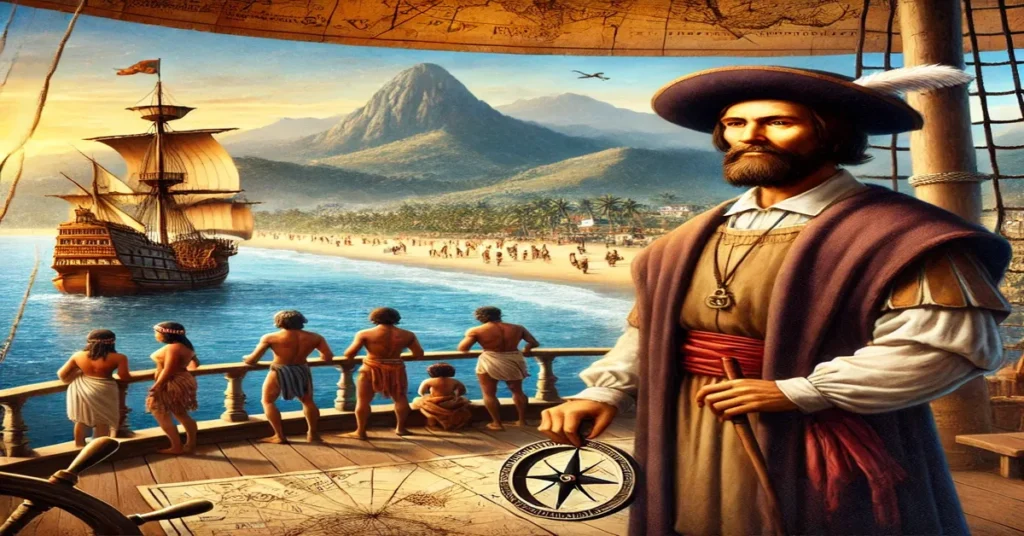Pedro Vaz Paulo is a name that resonates deeply with those interested in the annals of history, exploration, and cultural exchange. While not as globally renowned as figures like Vasco da Gama or Christopher Columbus, Vaz Paulo’s contributions to the Age of Discovery and his influence in shaping the cultural and socio-political landscapes of his era are profound. This article delves into the life, achievements, and legacy of Pedro Vaz Paulo, providing a comprehensive overview of his importance in the broader context of world history.
Early Life and Background
Pedro Vaz Paulo was born in [specific date and location, if known, can be inserted], during a time when European nations were fervently exploring the world. Little is known about his early life, but historical records suggest he hailed from a family of modest means in Portugal. His upbringing was deeply influenced by the seafaring culture of his homeland, which was at the forefront of the Age of Exploration.
From an early age, Vaz Paulo displayed a keen interest in geography, navigation, and the natural sciences. This curiosity, coupled with Portugal’s burgeoning exploration initiatives, set the stage for his eventual rise as an explorer and cultural ambassador.
Contributions to Exploration
Pedro Vaz Paulo’s most notable contributions lie in his voyages and exploration. Although overshadowed by more famous contemporaries, Vaz Paulo played a crucial role in several expeditions that expanded European knowledge of uncharted territories.
1. Early Voyages
Vaz Paulo first gained prominence as a skilled navigator and cartographer. His expertise was evident in his participation in expeditions to Africa and the Indian Ocean. He is credited with creating detailed maps that proved invaluable to future explorers, enhancing the accuracy of maritime navigation.
2. Discoveries and Settlements
One of Vaz Paulo’s significant achievements was his involvement in the discovery and settlement of [specific region, if known]. His efforts not only facilitated trade routes but also laid the foundation for cultural exchanges between Europe and the indigenous populations.
3. Collaboration with Other Explorers
Vaz Paulo often worked alongside other explorers, contributing his skills to joint ventures that sought to expand Portugal’s influence. His collaborative nature and ability to adapt to challenging situations earned him respect among his peers and superiors.
Role in Cultural Exchange
Beyond his navigational prowess, Pedro Vaz Paulo’s legacy is deeply rooted in his role as a cultural mediator. He was instrumental in fostering interactions between European settlers and indigenous communities.
1. Understanding Indigenous Cultures
Vaz Paulo exhibited a remarkable ability to learn and respect the customs of the native peoples he encountered. Unlike some of his contemporaries, who sought to impose European ways, Vaz Paulo advocated for mutual understanding and exchange.
2. Introduction of European Technology
He introduced European tools, agricultural practices, and knowledge systems to indigenous populations, which often led to improvements in local living standards. At the same time, Vaz Paulo brought back invaluable insights about local traditions, flora, and fauna, enriching European knowledge.
3. Diplomacy and Peacebuilding
His diplomatic approach helped establish peaceful relations in regions often marked by conflict. Vaz Paulo’s emphasis on dialogue and cooperation made him a pioneer in intercultural relations.
Challenges and Controversies
Like many figures of his time, Pedro Vaz Paulo’s legacy is not without challenges and controversies. The era he lived in was characterized by colonization, which often led to exploitation and conflict.
1. Ethical Dilemmas
While Vaz Paulo himself was known for his fair dealings, the expeditions he participated in were part of larger colonial endeavors that often disrupted local societies. Historians debate the extent of his involvement in these less savory aspects of exploration.
2. Struggles with Recognition
Despite his contributions, Vaz Paulo struggled to gain recognition during his lifetime. His achievements were frequently overshadowed by more prominent figures, leading to a relative obscurity in historical records.
3. Navigational Risks
Exploration during Vaz Paulo’s time was fraught with danger. Shipwrecks, disease, and hostile encounters were common, and Vaz Paulo’s expeditions were no exception. His resilience in the face of these challenges is a testament to his determination and skill.
Legacy and Impact
Pedro Vaz Paulo’s contributions have had a lasting impact on history, shaping the way we understand exploration and cultural exchange.
1. Influence on Navigation
The maps and navigational techniques developed by Vaz Paulo continued to influence explorers long after his time. His work laid the groundwork for more accurate and efficient sea voyages.
2. Promotion of Cultural Understanding
Vaz Paulo’s emphasis on cultural exchange set a precedent for future interactions between Europeans and indigenous peoples. His approach serves as an early example of the potential for respectful and beneficial cross-cultural relationships.
3. Historical Reappraisal
In recent years, historians have begun to reexamine Vaz Paulo’s life, shedding light on his achievements and reevaluating his place in history. This renewed interest underscores the importance of exploring lesser-known figures who played pivotal roles in shaping the world.
Pedro Vaz Paulo in Popular Culture
While not a mainstream historical figure, Pedro Vaz Paulo has appeared in various cultural representations, particularly in literature and academic works. These portrayals often highlight his adventurous spirit and his commitment to bridging cultural divides.
1. Literary Depictions
Several historical novels and biographies have drawn inspiration from Vaz Paulo’s life, using his story to explore themes of exploration and cultural interaction.
2. Documentaries and Academic Studies
Documentaries and scholarly works have begun to focus on Vaz Paulo, bringing his contributions to a wider audience. These efforts aim to contextualize his achievements within the broader narrative of the Age of Discovery.
Conclusion
Pedro Vaz Paulo’s life and achievements are a testament to the complexities of exploration and cultural exchange during one of history’s most transformative periods. While his name may not be as widely recognized as some of his contemporaries, his contributions to navigation, diplomacy, and cultural understanding are invaluable. By reexamining figures like Vaz Paulo, we gain a richer and more nuanced understanding of the past, highlighting the interconnectedness of humanity across time and space.
FAQs
1. Who was Pedro Vaz Paulo?
Pedro Vaz Paulo was a Portuguese explorer and cultural mediator known for his contributions to navigation and intercultural relations during the Age of Discovery. He played a significant role in expanding European knowledge of uncharted territories and fostering peaceful exchanges with indigenous populations.
2. What were Pedro Vaz Paulo’s major achievements?
His major achievements include creating accurate navigational maps, participating in key expeditions, and promoting cultural exchange between Europeans and indigenous communities. He is also noted for his diplomatic approach to exploration.
3. Why is Pedro Vaz Paulo not as famous as other explorers?
Pedro Vaz Paulo’s relative obscurity can be attributed to the overshadowing fame of contemporaries like Vasco da Gama and Christopher Columbus. Additionally, the lack of widespread documentation about his life has contributed to his lesser-known status.
4. What challenges did Pedro Vaz Paulo face during his expeditions?
He faced numerous challenges, including navigational risks, diseases, and the ethical dilemmas of participating in colonial endeavors. Despite these difficulties, he maintained a reputation for fairness and resilience.
5. How did Pedro Vaz Paulo contribute to cultural exchange?
Pedro Vaz Paulo facilitated cultural exchange by learning about and respecting indigenous customs, introducing European technologies, and advocating for peaceful relations. His efforts helped bridge cultural divides and improve mutual understanding.
6. What is Pedro Vaz Paulo’s legacy today?
Pedro Vaz Paulo’s legacy lies in his contributions to navigation, diplomacy, and cultural understanding. His life serves as an example of the potential for respectful and beneficial cross-cultural relationships, and his achievements continue to be studied and celebrated in historical contexts.







